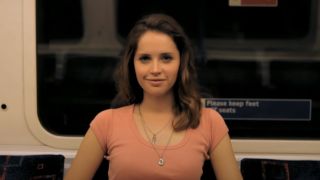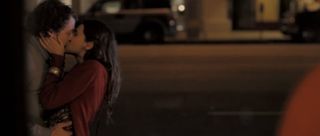Sundance Interview: Felicity Jones Pours Herself Into Like Crazy's Romance

Like Crazy wasn't just the first big film that everybody at Sundance seemed to fall in love with, but one of the festival's first big acquisitions, going to Paramount for $4 million in the first few days of the festival. The low-key and emotional romance stars Anton Yelchin and Felicity Jones as two college students who fall hard for each other, only to be separated by geography and all the other complications that come up when you're in love but with your whole life in front of you.
The film is directed by Drake Doremus, who had a film at Sundance just last year with Douchebag and brought his same independent, improv-influenced style to Like Crazy, even though he was working with experienced Hollywood actors this time around. I had the chance to talk to both actors on Monday, just hours after the new broke that Like Crazy would be a major studio release. First up is Felicity Jones, and check back tomorrow for my (even longer) conversation with Anton Yelchin. For a nice roundup on the critical response click here, and wait for my full festival review at some point down the line.
Jones is yet another one of those up-and-coming British actresses who is slowly but surely blowing away audiences whenever she shows up on the screen. Most recently she appeared as Miranda in Julie Taymor's The Tempest, though given that film's spotty distribution you probably didn't see it; she was also in Cemetery Junction, Cheri and Brideshead Revisited. I talked to her about the complications of an improv-based acting process, the way she and Yelchin built their onscreen relationship, and why acting isn't worth it unless you take risks.
There was a significant rehearsal process for this. How did your theater experience prepare you for this?
For the first two weeks we rehearsed just Anton, Drake and I, and it was like we were doing a play. If you can have that opportunity with a film, it helps you get such a stronger idea of the character. It's that kind of environment where you can make mistakes.
When Drake brought you on board what kind of idea of the character did he give you?
We were given the outline, 60 pages, that had every scene and certain beats you needed to hit and information you needed. But in terms of the character that was very much a process of development between Drake and I. The person that Anna is based on is someone who's very close to Drake. I read lots of her letters, and I just tried to work out who this person was. WIth something like this you bring a lot of yourself to it. You have to work with your instincts, so inevitably there's going to be a lot of yourself in that world.
CINEMABLEND NEWSLETTER
Your Daily Blend of Entertainment News
Was that scary for you as an actor?
No. I was ready to do something that was intense in this way, and different from what I had done before. I had worked with scripts, with dialogue. I like to change dialogue anyway, so to be able to completely invent the dialogue was just perfect. I think actors always find the dialogue doesn't quite fit, so you always have to play with it. To be able to invent it was a perfect opportunity.
Was there a lot of falling on your face in the first few days, trying things that didn't quite fit?
Yes. You're always quite nervous when you first start, and you speak a lot, and overcompensate. And what's more interesting, as always, is when people aren't speaking. It's a process where you gradually find the right words, and you don't need so many.
There's so much writing and photos exchanged between Anna and Jacob in the movie. Did you guys create that?
Absolutely. With Drake I did everything that you see in the film, it's my writing, I wrote a poem and the letters. I think it's a great idea, because it means that you personally invest in the film. You have to take risks. I realized in doing this film, if you don't take risks, a true risk, then you're never going to produce something interesting.
What's the risk here?
The risk is of being exposed. I've never done something where I've had to trust the director so completely. Obviously you have a script, and there's a character shape already there. But because I was bringing so much of myself to it, it was difficult.
What's it like seeing this with an audience?
I saw it a few weeks ago, and i got a sense of what was going on. So often we could do 10 takes, and they were 20-minute take. There was so much material to choose from. The character was very much a construction, more so than I thought. I thought there would be more of myself in it. What was interesting is she was something very different from me.

You make this movie so small and on such a low budget, and then there's the amazing news that it got picked up by this major studio, Paramount. Do you think mainstream audiences are ready for a love story this honest?
Absolutely. I was thinking Love Story, obviously, was a romantic film of that time. In a way Like Crazy keys into our generation, this idea of now we can still be in communication. Where do the boundaries of relationships end? He's in bed with Sam but he's texting someone else, and Anna's doing the same thing. It's a very contemporary issue.
Do you think that Drake being pretty young adds to that authenticity? This takes that young connection seriously.
I think he's not scared to use technology in his films. You know sometimes when people try and use texting, and it doesn't work. It's so much part of how we communicate, there's no fear of using it, which would come from being that young. He's grown up as part of that. He didn't shy away from it.
With the connections you were building in the rehearsal process, did it also help that you were all around the same age, all recognized the same generational milestones?
Absolutely. It was the most intense two weeks of my life. Drake, in a rather manipulative way-- which is what a true director should do-- we would rehearse from 3 p.m. to sometimes 3 a.m. 4 a.m. in the morning. There's a shift, so the world closes down, so you can totally focus your energies on rehearsal. I really liked Breaking the Waves with Emily Watson, and Lars von Trier is obviously known for manipulating his actors, and Drake I thing is very good at that-- without the violent end. It's good to break down the convention of filmmaking, and I feel like he does that.
The shot when you guys are in bed for the whole summer, and it's shown in a series of shots of you in bed and in different clothes. How long did it take?
You should ask Drake, I think it's something like 60 changes. And we did it one after another, and I think we did it in an hour. The whole thing was very intimate-- we didn't have dressing rooms or anything like that. We all become very familiar with each other. Even Drake, he likes to keep the acting quite separate, so you're not being distracted from being in it, from being in the movie.
Staff Writer at CinemaBlend
Most Popular





